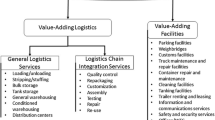
Overview
- First scholarly book to address port cluster development and collaboration options
- Contains unique empirical results on which forms of integration are more likely to result in an improved competitive position
- Fulfills the knowledge gap sought by port managers considering port cooperation or integration options and expected outcomes
Part of the book series: Palgrave Studies in Maritime Economics (PSME)
Access this book
Tax calculation will be finalised at checkout
Other ways to access
About this book
This book addresses the strategic alignment between port authorities and their supply chain partners, with a focus on governance challenges. Many port (authority) managers are engaged in efforts to improve their strategic alignment with business partners in their proximate geographic region, yet the economic objectives pursued can vary widely. These objectives can include improvements in port competitiveness and stability of traffic flows, as well as better access to scarce resources such as land and capital, or simply more control over the logistics chain. Using various Benelux seaports as case studies, the authors of this volume show that improving strategic alignment can involve a wide variety of different governance choices, ranging from top-down to bottom-up alliance formation, from project-driven to multi-activity collaboration, and from long-term contracting to full-fledged mergers.
This book with state-of-the-art insight on modern port governance will be of interest to port managers around the globe, as well as to lecturers and students in maritime educational programs.
Chapter 4 is available open access under a Creative Commons Attribution 4.0 International License via link.springer.com.
Similar content being viewed by others
Keywords
Table of contents (6 chapters)
-
Front Matter
-
Back Matter
Reviews
“The book is both extensive and unique in examining the spatial and activity scope of port collaboration, but its focus remains on the Benelux region within Northwest Europe. … This book should therefore be seen as a solid and inspiring building block for a broader scope analysis of port collaboration, as opposed to being the definitive work on the subject matter.” (Michaël Dooms, Maritime Economics & Logistics, Vol. 22, 2020)
Editors and Affiliations
About the editors
Dr Alain Verbeke is Professor of International Business Strategy and holds the McCaig Research Chair in Management at the Haskayne School of Business, University of Calgary. He is also the Area Chair of the Strategy and Global Management Group at the Haskayne School of Business. In 2014, Dr. Verbeke was elected as the Inaugural Alan M. Rugman Memorial Fellow at the Henley Business School, University of Reading (UK). He is the Editor-in-Chief of the Journal of International Business Studies (2017 – 2019) and has authored or edited more than 30 books and more than 200 refereed publications.
Bibliographic Information
Book Title: Sustainable Port Clusters and Economic Development
Book Subtitle: Building Competitiveness through Clustering of Spatially Dispersed Supply Chains
Editors: Elvira Haezendonck, Alain Verbeke
Series Title: Palgrave Studies in Maritime Economics
DOI: https://doi.org/10.1007/978-3-319-96658-8
Publisher: Palgrave Macmillan Cham
eBook Packages: Economics and Finance, Economics and Finance (R0)
Copyright Information: The Editor(s) (if applicable) and The Author(s) 2018
Hardcover ISBN: 978-3-319-96657-1Published: 25 March 2019
Softcover ISBN: 978-3-030-40323-2Published: 25 March 2020
eBook ISBN: 978-3-319-96658-8Published: 18 March 2019
Series ISSN: 2662-6551
Series E-ISSN: 2662-656X
Edition Number: 1
Number of Pages: XX, 181
Number of Illustrations: 11 b/w illustrations, 8 illustrations in colour



